- Home
- André Aciman
Enigma Variations Page 2
Enigma Variations Read online
Page 2
The closer I neared our house, the more I began dreading the sight of what they’d done to it. The thought of the fire and of the looting, the looting especially, was enough to stoke a demon of sorrow, anger, and spite aimed not only at everyone living here but also against ourselves, as though the inability to prevent plunder and vandalism by alleged friends and neighbors sat on our conscience more than on theirs. “Don’t rush to conclusions,” my father had warned, “and above all don’t argue.” This was my father’s way. I cared for none of it. I would gladly have dragged each one to court, rich, poor, orphans, widows, cripples, and war disabled.
And yet, of all the people here, there was only one I wished to see, and he was gone, sparito. I knew this already. So why even bother asking after him? To see how they’d react? To remind myself that I hadn’t invented him? That he’d truly lived here once? That all I had to do was ask about him in the barbershop, and after inquiries were shouted out by so many up and down the narrow, cobbled lanes of San Giustiniano Alta, he would finally turn up just because people had called his name?
Why should he even remember me? He had known me as a twelve-year-old, now I was twenty-two and sported a beard. Yet the years had done nothing to make me forget the rising anxiety that seized me each time I both dreaded and hoped to bump into him at the beach or around town. Wasn’t this what I really hoped to feel as I made my way up to his shop this morning? The fear, the panic, the old tightness in my throat, which only a sob could release and which might erupt of its own if he so much as stared at me longer than I could stand. He stares at you, you get worked up, and all you want is to find a quiet spot to let yourself cry the moment you’re alone, because nothing, not even failing a Latin and Greek exam or getting badly yelled at, could leave you feeling so beaten and undone. I remembered everything. The wanting to cry, especially, and the waiting to see him because the waiting and hoping were unbearable, the wish to hate everything about him because one short glance from him and suddenly you felt totally distraught and couldn’t smile or laugh or find joy in anything.
* * *
I WAS WITH my mother the first time I met him. He did not wait to be introduced but right away, “You’re Paolo,” he said, tousling my hair.
When I gave him a startled look to mean how did he know, his answer was a jaunty “Everyone knows.” Then, seeming to remember, “Maybe from the beach,” he said.
I knew that his name was Giovanni, just as I knew that everyone called him Nanni. I had seen him at the beach, in the outdoor movie theater by the church, and many times around Caffè dell’Ulivo at night. I had to control myself from showing how thrilled I was to discover that the man before whom I could have sworn being a complete nonentity not only knew my name but was actually standing under my own roof.
Unlike him, though, I did not show that I knew him. My mother introduced him to me with a note of irony in her voice, meaning, But surely you do know Signor Giovanni.
I shook my head and even managed to pretend being embarrassed for being rude at not knowing his name.
“But everyone knows Signor Giovanni,” she insisted, as though urging me to find it in me to be polite. But I did not bend.
He gave me his hand. I shook it. He looked younger, and his skin was less dark than I remembered. He was tall, slender, in his late twenties. I’d never seen him up close before. Eyes, lips, cheeks, jaw. It would take me years to know what exactly about each feature had struck me.
On my father’s suggestion, my mother had asked him to come by to restore an antique folding desk and two picture frames dating back to the previous century.
He arrived one morning in June, and contrary to custom, he accepted the lemonade she offered. Everyone else who came to our house—the seamstress, the delivery boys, the upholsterer—always asked for water. It was their way of earning their salary plus the inevitable gratuity by showing they owed us nothing and hadn’t asked for anything more than the glass of water we’d put before them on a scorching summer day.
That morning in our house, because he stood so very close to me, something undefined in his face left me as shaken and flustered as when I was asked once to recite a poem in front of the entire school, teachers, parents, distant relatives, friends of the family, visiting dignitaries, the world. I couldn’t even look at him. I needed to look away. His eyes were too clear. I didn’t know whether I wanted to touch them or swim in them.
As he spoke to my mother and occasionally looked in my direction, as though eager to draw my opinion, I would try to stare back at him. But looking into his eyes was like looking down a steep, craggy cliff leading to a billowing green ocean below—you were pulled in and were told not to fight back but warned not to stare, so that you could never look long enough to know why you kept wanting to stare. His gaze didn’t just scare me. It troubled me, as if in staring into it I’d risk not only offending him but also exposing some sinister, shameful secret about myself that I did not wish to disclose. Even when I tried to return his glance to reassure myself that he wasn’t as threatening as I feared, I still had to look away. He had the most beautiful face I’d ever seen, and I wasn’t brave enough to look at it.
And yet each time he turned his gaze away from my mother to look at me, he was also telling me that although he was much older and could see right through me, he and I could be equals, that he wasn’t judging me, held no scorn, was interested in what I might have to say about the furniture even if I was just standing quietly, trying to hide how thoroughly unworthy I felt.
So I would look away.
Though I couldn’t do that either.
The last thing I wanted was to seem shifty, especially with my mother in the room.
His face was the picture of health, and there was a flush about it, as though he’d just come from swimming. His even-tempered and accommodating smile when it quivered to express his thoughts or his doubts about the desk told me of the very person I wished to be someday. What a pleasure to look at his face and hope to be just like him. If only he could be my friend and teach me things. I had no other concept to draw on.
My mother had meant to show him into the living room, but he had already guessed where it was and had immediately spotted the desk, opened it, and without asking permission hastily proceeded to remove its two slim, squeaky, but unusually long drawers. Before you knew it, he was reaching behind the empty drawer slots and palming his way inside the hump of the bombe-form cylinder desk, groping around until he found the hidden recess, and after some exertion, he fished out a small hidden box with curved corners that matched the design of the rounded desk itself. It caught my mother’s breath. How did he know this box existed? she asked. Great carpenters, usually from the north, possibly French, he said, always liked to show they could create hidden spaces in the most impenetrable spots; the smaller the piece of furniture, the more arcane and ingenious the hiding place. And there was something else he needed to show her, which she most likely also knew nothing about. “What is it, Signor Giovanni?” He lifted the desk a bit and showed her hidden hinges.
“What are they for?” she asked. The desk, he explained, was totally collapsible so that one could carry it elsewhere very easily. But he didn’t want to task the hinges right now because he didn’t trust the condition of the wood. He handed my mother the tiny wooden box.
“But this desk has been in my husband’s family for at least a hundred and fifty years,” she said, “and yet no one had any idea this box existed.”
“Then the Signora will discover either hidden jewels or letters some great-grandparent would rather she knew nothing about,” he said, stifling the quiver of mirth and mischief that I’d seen rippling on his features a few times already that morning and that made me want to learn to smile just like that.
The box was locked.
“I don’t have a key,” she said.
“Mi lasci fare, Signora, allow me,” he said, every word underwritten with both deference and authority. So saying, he removed from his jacket a ring of
tiny tools that looked less like awls, gouges, and screwdrivers than a collection of sardine-can openers of all sizes. He then took his eyeglasses from his breast pocket, unfolded both temples, and cautiously slipped the tip of each behind an ear. He reminded me of a boy in kindergarten who had started wearing glasses and was still awkward when putting them on. Then, using his extended middle finger, he pushed the bridge of his glasses ever so delicately over his nose. He might as well have been placing a priceless Cremonese violin under his chin. There was fluency and dexterity in every one of his gestures that stirred not just trust but admiration. What surprised me was his hands. They were neither calloused nor marred by labor or by the products of his trade. The hands of a musician. I wanted to touch his hands, not just because I wanted to see if the pink of his palms was as smooth to the touch as his hands promised, but because, suddenly, I wanted to place my palms under the care of each of his. Unlike his eyes, his hands did not intimidate—instead they welcomed. I wanted his long knuckles and almondine fingernails to slip in between each of my fingers and hold them down in a warm and lasting display of good fellowship, and with this gesture alone repeat the promise that one day, perhaps sooner than I hoped, I too would be a grown man with hands like his, wearing glasses like his, letting a glint of mirth and mischief radiate through my features to tell the world I was an expert at something and a very, very good man.
He saw us watching him trying to pry open the box, and without looking in either my direction or my mother’s, he kept smiling to himself, conscious of our suspense, all the while trying to dispel it without suggesting he was aware of it. He knew what he was doing, had done it many times, he said, all the while staring straight into the keyhole. “Signor Giovanni,” my mother said as he was still fiddling with the lock, trying not to distract him. “Yes, Signora,” he replied without looking up. “You have a beautiful voice.” He was so deeply engrossed with the lock that he didn’t seem to hear her, but seconds later, “Don’t be fooled, Signora, I can’t carry a tune.” “With that voice?” “Everyone laughs when I sing.” “Because they’re jealous.” “Trust me, I can’t even sing ‘Happy Birthday.’” All three of us laughed. There was a moment of silence. Without rushing or forcing things or scratching the bronze inlay area around the old lock, he picked at it some more, then “Eccoci!” he exclaimed, “here we are,” and a few seconds later, as though all that was needed was a bit of persistent, gentle coaxing before even hearing the telltale click of the lock, which had finally yielded, the box opened. I wanted to kiss his hands. What he revealed when he opened it was a gold pocket watch, a pair of gold cuff links, and a fountain pen lying on a lining of thick verdigris felt. On the side of the pen, in gold lettering, was my grandfather’s full name, my name as well.
“Who would have known!” exclaimed my mother. These were her father-in-law’s cuff links bearing his initials and dating back most probably to his student days in Paris. He was very attached to them. She also remembered seeing the vest watch, though long ago. He must have left the three of them there, but when he never came back after the accident, no one even noticed they were gone. “And now they’re suddenly here—but he is not.” My mother seemed deep in thought. “I was very fond of him, and he of me.”
The cabinetmaker bit his lower lip and nodded quietly.
“This is the cruel thing about the dead. They come back in ways that always catch us off guard, don’t they, Signor Giovanni?” Mother said.
“Yes,” he agreed. “Sometimes, just wanting to tell them something that would have mattered to them, or to ask about people and places only they would have known about, reminds us that they’ll never hear us, won’t answer, don’t care. But perhaps it’s much worse for them: maybe they are the ones calling out to us and it is we who can’t listen and don’t seem to care.”
Nanni had obviously known sorrow in his life. You could tell by how solemn and quiet he’d grown within seconds of smiling. I liked him solemn too.
“You’re a philosopher, Signor Giovanni,” said my mother with a docile smile on her face as she held the open box in her hands.
“Not a philosopher, Signora. I lost my mother a few years ago when she tripped down the stairs, and within months I lost my father too. Both were in perfect health. But before I knew it I became an orphan, the boss, and a parent to my younger brother. Still, there is so much I need to ask them, so much I could have learned from my father. All he left behind is barely traces.”
An awkward silence followed. Nanni continued to examine the desk, and after observing the hinges, he said that someone must have worked on this desk before. Which explained why it still had such a strong sheen. “It was probably my grandfather,” he said. My mother was about to give the crown of my grandfather’s watch a few twists to wind it. But the ebanista told her not to. “It might ruin the spring mechanism. Better have someone look at it.”
“The watchmaker?” she asked naïvely.
“The watchmaker is an idiot. Maybe someone on the mainland,” he said.
Did he know of one?
Yes.
He could bring it to the watchmaker himself the next time he took the ferry across.
She thought for a moment, then said she’d ask my father to take it in.
“Capisco, I understand,” he said, with the retiring gesture of a person seemingly guilty of an infraction he knows he hasn’t committed but is graceful enough to accept the implied suspicion of those who distrust his motives.
I did not like this about my mother. But there was nothing I could say to mend her allegation without drawing further attention to it.
But with this one word, the ebanista said he was happy to have been of help. She was still thinking of the contents of the box and remained silent. Signor Giovanni did not intrude on her silence, and probably not knowing what else to say, he looked around the room for a moment, and finally, coming back to the purpose of his visit, said he would take the desk and restore it to what it must have looked like when it was first built. He recognized the style, he said, but wouldn’t pronounce himself as to its builder yet, as the signature under the desk was smudged with age. What he particularly admired, he said as he lifted the desk over his shoulders, was that the designer seemed to have avoided using nails anywhere other than on the hinges. But he wasn’t sure about this either, he’d let us know. He said he would come back another day to pick up the frames and walked out of our house while the two of us stood at the doorway.
“Here, take it, it’s yours now,” said my mother, handing me the pen, which, as luck would have it, turned out to be a Pelikan. The pen looked exactly like the ones sold in the stationery store outside my school. But I found no joy in the pen. It had come like an afterthought, a chance concession, not a gift, and yet on it was inscribed my name, and this pleased me. As we watched Signor Giovanni leave, she told me a strange tale she had heard from her father-in-law: while writing one day during his time in Paris, he had dropped his pen from his desk, and in his rush to catch it, the nib punctured his skin.
“And?” I asked, not seeing her point.
“It left a small tattoo on the palm of his hand. He was quite proud of it. He liked to tell the story of how it had happened.”
Why had she told me this?
“No reason,” she said. “Maybe because we all wished he had seen you. Your father loved him more than he loved anyone else, I think. In any event, I’m sure he would have wanted you to have his pen. It might help you with the exam coming up.”
Later that fall when I retook my Latin and Greek exam, the pen helped.
* * *
WITHIN A FEW afternoons, Nanni returned to pick up the frames. My father had taken an earlier ferry and was already home by then.
When we heard the doorbell, my father stood up and opened the door himself. Gog and Magog stood up as they always did when he left the room and followed him.
“Stai bene? Are you all right?” he asked as soon as he saw Nanni standing outside.
“Benone
, e tu? Well enough, and you?” asked Nanni.
Nanni explained he had come for the frames and could stay only a minute. He patted the dogs on the head.
“How is the elbow?” my father asked.
“Much better.”
“Did you do what I told you?”
“I always do—you know that—”
“Yes, but did you do it for thirty seconds each time?
“Ye-es!”
“Show me how.”
Nanni was about to show how he performed the particular extension of the arm that my father had recommended, but seeing me at the door, he blurted out, “Ciao, Paolo,” totally surprised by my presence, as though he’d forgotten I existed or lived here.
He brought down his arm and headed straight for the living room and picked up the two frames leaning against the wall. He managed to exchange a few pleasantries with my mother, who was sitting on the sofa reading a novel. Had she done anything with the watch?
Not yet, unfortunately. She sounded peeved. My mother did not like to be reminded of things she had overlooked.
There was an awkward moment when all four of us stood speechless.
“Did you know that he’s the fastest swimmer in San Giustiniano?” said my father to my mother.
“Ma che cosa stai a dire? What are you saying?” protested Nanni.
Of course I knew that my father liked to swim every morning before coming back home and catching the ferry to the mainland, but I didn’t know that Nanni was a swimmer as well.
“We call him Tarzan.”
“Tarzan, what a pretty name,” said my mother with a dash of irony in her voice, as though she had never heard the word before and was determined not to participate in the inane banter between the small-town cabinetmaker and the world-famous scholar. My father’s camaraderie with Nanni vexed her, I could tell.

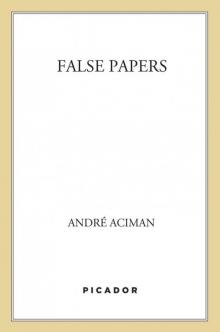 False Papers
False Papers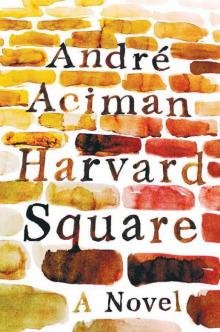 Harvard Square
Harvard Square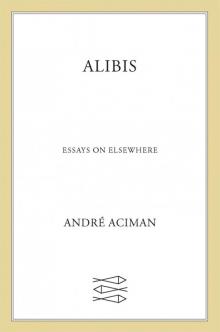 Alibis
Alibis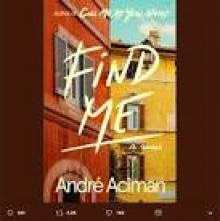 Find Me
Find Me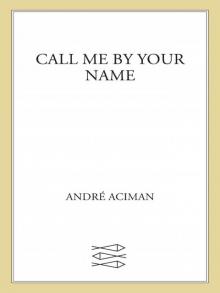 Call Me by Your Name
Call Me by Your Name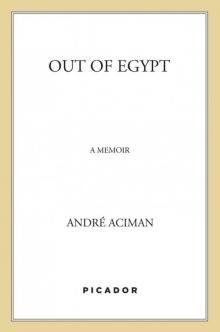 Out of Egypt: A Memoir
Out of Egypt: A Memoir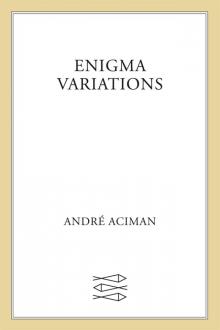 Enigma Variations
Enigma Variations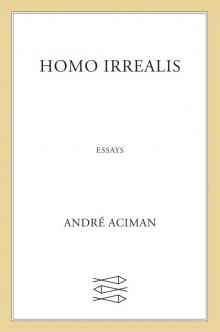 Homo Irrealis
Homo Irrealis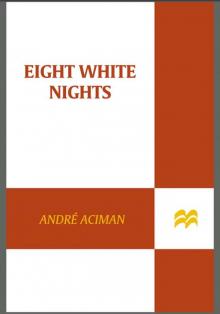 Eight White Nights
Eight White Nights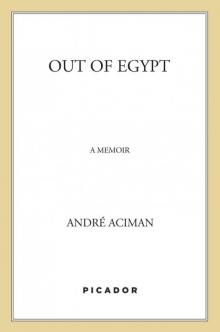 Out of Egypt
Out of Egypt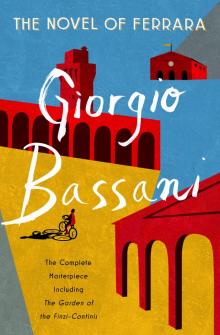 The Novel of Ferrara
The Novel of Ferrara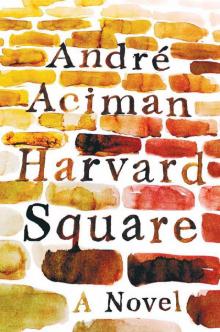 Harvard Square: A Novel
Harvard Square: A Novel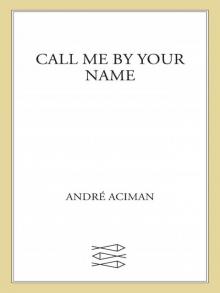 Call Me by Your Name: A Novel
Call Me by Your Name: A Novel